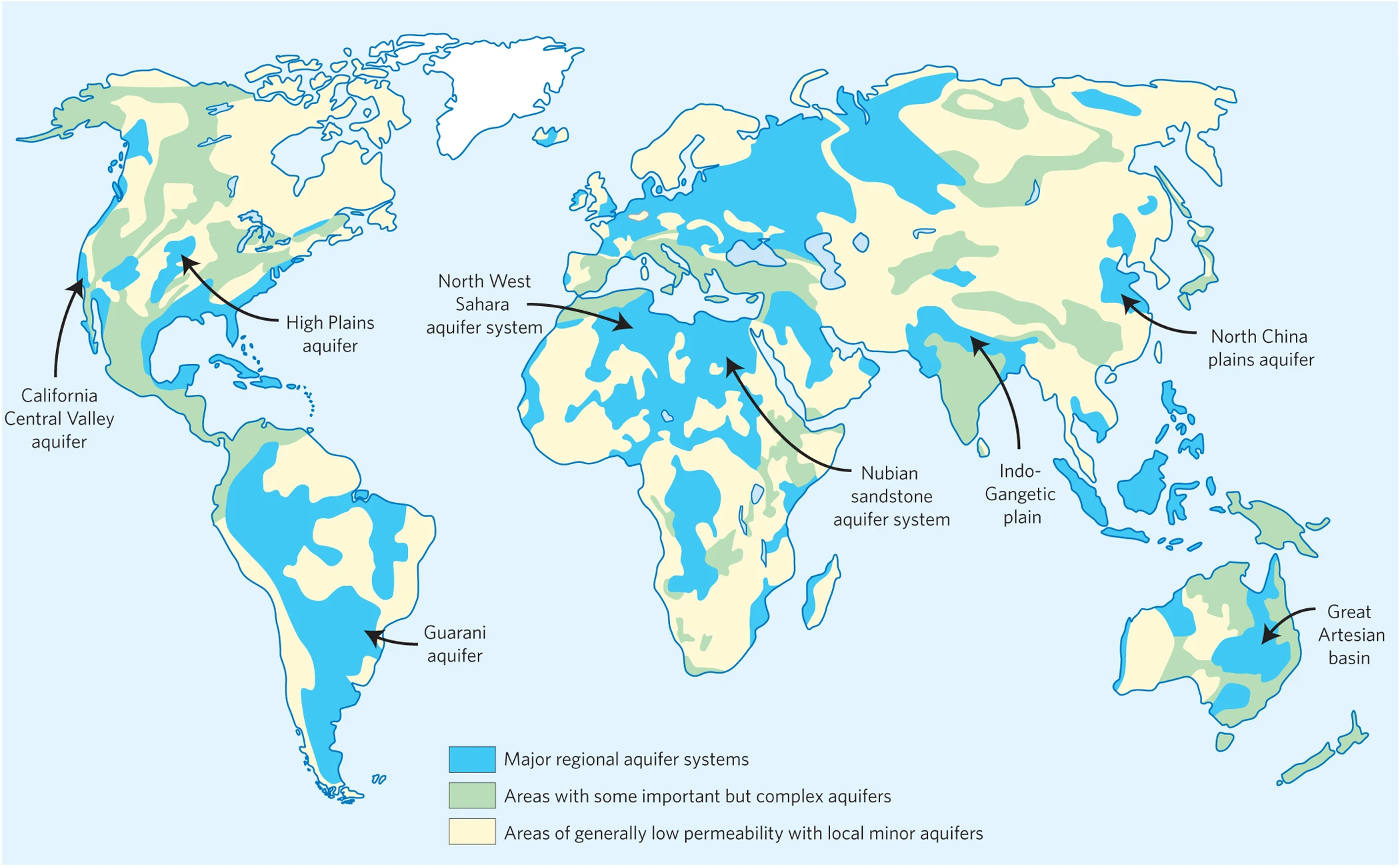Groundwater: "out of site and all too often out of mind."
 |
Groundwater is the largest store of unfrozen water on this planet, lots of aquifers are comprised of ancient stores of water which has been collecting for thousands of years. African countries are not the only regions of the world which use groundwater as a main source of fresh water- half the global population rely on groundwater for potable water.
What is the issue with groundwater?
- It is "out of site and all too often out of mind" (Gaye and Tindimugaya, 2019). For this reason, groundwater has been excluded from most water scarcity metrics, only including above ground water as an accessible of safe water as it can be quantifiably measured (Damkjaer and Taylor, 2017). The recharge periods (time needed for rain to refill an aquifer) are not widely known or researched, therefore we do not truly know if we are overexploiting groundwater. Furthermore, seasonable variability is not considered, let alone how climate change altering precipitation will affect recharge rates.
- Transboundary sharing can be another reason as to
why groundwater is excluded from water scarcity metrics due to the debates over
who controls it (Aureli and Eckstein, 2011). The shortcomings in groundwater management and the recharge rates often are due to inconsistent leaderships or different priorities within leaderships (Braune and Xu, 2019).
- Again, Africa is spoken about as one entity, despite all the individual and distinct cultural and physical properties each country possesses. This often leads to a one size fits all "solution" when advising countries on how to use their groundwater sustainably. In fact, as you can see in Figure 1, not every aquifer is the same, so each country will have a different capacity of the water they can abstract. For example, Ghana is more suited to small scale local groundwater abstraction as they have shallow aquifers due to the low permeable geology.
 |
| Figure 1: Aquifers across the world, from which groundwater is extracted to provide water for a range of uses depending on the specific countries needs (Taylor et al., 2013). |
So mainly groundwater could be a solution to access to safe water in the future, but as it stands not enough studies have been conducted to understand how to sustainably extract it and include it in water scarcity metrics. The next blog will focus exclusively on environmental change in relation to water and development.


Hello Beth! This is an extremely informative post and I really appreciated your use of the map to highlight the geographical spread of aquifers. I found it very interesting to see that many of the aquifers lie beneath very dry areas on the surface (such as the Sahara). Whilst you covered all of the issues with groundwater, would you be able to explain one of the benefits of using groundwater?
ReplyDeleteThank you- I always find visuals make a statement more poignant!
DeleteThe primary benefit in my eyes for using groundwater would be due to it being renewable (if we research it properly and include it in water scarcity metrics, and don't over extract it!). Despite rainy or dry seasons it will provide a source of water all year round so the growing seasons which may be altering with climate change may be less effected as you have a source of irrigation when the water in rivers and lakes dry up.
Another important benefit is the fact it is stored underground away from evaporation (unlike reservoirs) and is not a standing body of water which could lead to water borne diseases spreading.
Hi Beth, really enjoying your blog! As you've mentioned - there is a lot of uncertainty regarding detailed aquifer knowledge, despite reliance for water supply in many communities. Regarding future management plans and policy regarding groundwater use - do you think research into specific aquifer characteristics should be prioritised?
ReplyDeleteHi Eleanor- thanks! Yes I do believe specific management for each aquifer is required. This would allow a full understanding of the groundwater storage and provide a certain volume of water which could be abstracted, reducing the chance of over extracting and leading to this water source becoming unsustainable. This should be prioritised and put into policy.
DeleteHi Beth, very engaging post and great content covered. Its a shame to know that there isn't enough research regarding groundwater, especially when we know that Africa have loads of it. Since you've listed a few disadvantages, do you think there are better options available instead of groundwater?
ReplyDeleteHi Peng Peng, thank you for your comment. Personally I believe groundwater may be the better option but only if we research it more as it could be a sustainable way forward. Pair this with other community based strategies, such as rainwater harvesting, could provide a solution on a smaller scale and a larger scale. I do acknowledge that with today populations dams may be the only solution where groundwater may not be accessible (which in some cases could be in Ghana).
DeleteHi Beth! Your focus on groundwater really sheds light on its crucial role in water management and its potential as a viable water source. The acknowledgment of groundwater as the largest store of unfrozen water on Earth really emphasizes its significance. However, it can sometimes be quite a controversial matter… What is your opinion on some issues around it such as land grabbing and over exploitation?
ReplyDelete